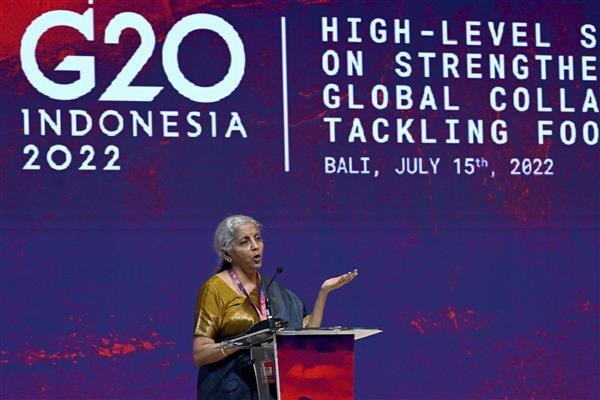The Union Finance Minister Nirmala Sitharaman emphasized the necessity of enhancing the G20 Common Framework’s effectiveness and expressed positivity about the Resilience Sustainability Trust (RST) being operationalized by the end of 2022.
FM Sitharaman was speaking at the third session of the International Financial Architecture Conference in Bali. Bali, Indonesia, is organizing the third G20 Finance Ministers and Central Bank Governors (FMCBG) meeting. See here.
https://twitter.com/FinMinIndia/status/1547820315530895360
She acknowledged the valuable contribution of an Expert Panel on the Multilateral Development Bank. She also laid down the framework for implementing its recommendations.
Nirmala Sitharaman, the Union Finance Minister, arrived in Bali, Indonesia on Thursday to take part in the G20 summit. She spoke at the Sustainable Finance for Climate Transition roundtable, emphasizing the importance of blended finance and optimizing private capital to achieve sustainable development objectivity.
The Union Finance Minister also emphasized that India is leading the way in global knowledge exchange while also assisting in the development of resilient livelihoods for small-holder farmers and adaptation capacities to climate change. See here.
https://twitter.com/FinMinIndia/status/1547863314440794113
FM talked about the importance of ensuring developing and emerging economies have access to food, fuel, and fertilizers as global public goods in her remarks. Additionally, she emphasized how critical it is to improve the world’s food system and food production.
FM also discussed India’s experience, including significant growth in agricultural productivity, citizen-focused food security initiatives, and cutting-edge delivery systems like the ground-breaking One-Nation-One-Ration Card programme.
The FM mentioned that 2024 will be recognized as the International Year of Millets throughout the world. India can make a significant contribution to global food security through the production of millet as it is a major millet-producing country in the world.
The Union Finance Minister emphasized that India is leading the way in the world in terms of knowledge exchange and is also assisting in the development of small-holder farmers’ potential for climate change adaptation as well as resilient means of sustaining their livelihoods.
During the discussion, the FM also proposed a “4I strategy” that combines inclusion, interconnectedness, innovation, and investment to address the issues of global food security. See here.
https://twitter.com/FinMinIndia/status/1547863316827377669
Previously, Nirmala Sitharaman, the Union Finance Minister, participated in the second session of the G20 Finance Ministers and Central Bank Governors (FMCBG) meeting. During the session, she expressed her views on the G20’s health agenda, as well as its pandemic preparedness and response plans.
The Union Finance Minister emphasized the need for rapid resource mobilization and allocation for medical emergencies.
The FM has called for a global coordination mechanism to be established, with WHO as its focal point. She also stated that India is dedicated to supporting all attempts to safeguard against and prepare for a future pandemic.
G20
The G20 is an informal group of 19 countries and the European Union (EU) that was formed in 1999 with representatives from the International Monetary Fund and the World Bank.
Argentina, Australia, Brazil, Canada, China, France, Germany, India, Indonesia, Italy, Japan, Republic of Korea, Mexico, Russia, Saudi Arabia, South Africa, Turkey, United Kingdom, United States, and the European Union are its members.
The G-20 agenda, which depends heavily on the guidance of Finance Ministers and central governors, is finalized by a unique system of ‘Sherpas’, who are special envoys of G-20 leaders.
As globalization is getting advanced and various issues are becoming more intricately intertwined, the G20 summits began to focus less on macroeconomics and trade and more on a broad range of international issues that have had a significant impact on the world economy.
The G20 has sought to realize an inclusive and sustainable world through its contributions to the resolution of the world’s most pressing issues.













